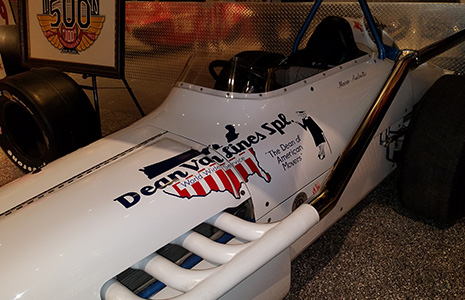In October, Ron Watson and Joie Chitwood III had lunch at a restaurant in Daytona Beach, Florida. As lunches go, it was unremarkable. Both were dressed in Florida casual -- shorts, polo shirts and flip-flops. The conversation was light and breezy. It only became remarkable to Chitwood in retrospect. A few days they met, Watson died unexpectedly, and Chitwood replayed their chat again in his mind.
Ron Watson was one of racing’s unseen, unsung heroes. As the founder and president of the Motorsports Hall of Fame of America, he oversaw its relocation from humble beginnings in the late 1980s in Novi, Michigan, to its current location at Daytona International Speedway.
Chitwood, the former president of Indianapolis Motor Speedway, DIS and International Speedway Corporation, recalled talking to Watson about the past, the present and the future of the hall of fame during their lunch.
“The next thing you know, 90 minutes had passed,” Chitwood said last week during a celebration of Watson’s life at the facility he helped build. “We were laughing and having fun. We talked about the past, we talked about the present, and we talked about the future. The past was retelling the stories of how challenging it was to find a permanent home for the hall -- the stops and starts and near-misses, and trying to get the board of directors moving in the right direction. I shared some funny stories about when I joined the board. The minute I joined, the next thing I know I was thinking, ‘Oh my gosh, we’re in trouble. What do we need to do?’”
When the conversation turned to the present, Chitwood reminded Watson of what had been accomplished. In the mid-2010s, the Novi facility was in financial trouble. The building was cramped, the location not ideal for drawing a large audience, the money fading quickly. That’s when Watson reached out and found a new home.
“There was a moment in the lunch where we talked about the present,” Chitwood said. “I kept saying to Ron, ‘You did it. You did it. We found a home. It’s here.’ It felt like he let out this big breath. It was like, ‘Yeah, we did.’ The tension left him. It just made the conversation that much more fun. Of course, it only lasted for a few minutes, because then he was like, ‘But Joie, we want to expand.’ I was like, ‘OK, Ron, we can talk about the future, but let’s enjoy what you did.’”
If you’ve been to Daytona and haven’t visited the MSHFA, you’re missing something important. As racing halls of fame go, it’s unique because of its scope. It isn’t limited to one form of motorsport or one track. It includes everything. Land-speed record-setters are on display. Motorcycle racing is represented. Stock cars, drag racing, boats and airplanes are on display.

And, of course, an extensive portion of the hall is dedicated to Indy car racing. Ray Harroun, the first Indy 500 winner, is an inductee. So, too, are modern-day participants like A.J. Foyt, Michael Andretti, Bobby Rahal and Chip Ganassi. Dario Franchitti was inducted earlier this year. Among the newest displays are Mario Andretti’s Daytona 500 winner from 1967 and the famed Dean Van Lines roadster from his rookie season in 1964.
At the gathering to honor Watson, Chitwood shared the podium with NASCAR legend Bobby Allison, sports car legend Hurley Haywood, Watson’s son Brendan, MSHFA president George Levy and T.E. McHale, the chairman of the board of the MSHFA, American Honda’s motorsports manager and a familiar face at NTT IndyCar Series races.
Chitwood knows the legends of Indy. Through his grandfather, who raced in the Indianapolis 500 seven times, Chitwood heard numerous stories. One of the themes that fascinated him was the folklore surrounding ride-along navigators/mechanics. The ones held in the highest esteem were those who rode with winning drivers.
“It was always, ‘Who did you ride with?’” Chitwood said. “It was a badge of honor with anybody. I learned those stories from my grandfather back in the day.”
He used then as an analogy in his speech honoring Watson.
“Who was Ron Watson? Who did he ride with?” Chitwood said. “Well, he rode with the heroes of our sport. He rode with the legends. He created a home for their stories to be told. You hope that as young people come and visit and see their stories that somebody gets caught by that lightning strike and says, ‘I want to do that. I want to be legendary, too.’ We need people like that, people with a passion for something, people who can face whatever challenge is out there. Ron’s passion helped him figure it out.”
Racing is blessed by its Ron Watsons, people who don’t seek glory, don’t win races, don’t do burnouts after winning. They’re behind the scenes, creating a way for others to be recognized. They are the backbone of the sport. At times, they encounter difficulties, but they persevere. They make it work, then step aside to let others enjoy the attention.
“There were so many things that went into trying to get this put together,” Chitwood said, looking around the collection of cars and memories. “Ron was a special person.”